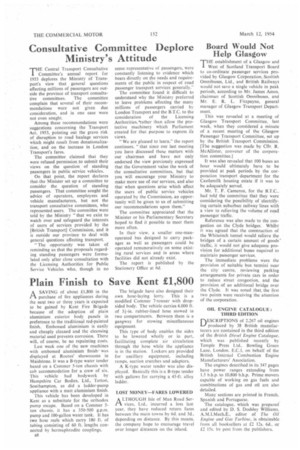Consultative Committee Deplore Ministry's Attitude
Page 42

If you've noticed an error in this article please click here to report it so we can fix it.
THE Central Transport Consultative J. Committee's annual report for 1953 deplores the Ministry of Transport's view that general questions affecting millions of passengers are outside the province of transport consultative committees. The committee complain that several of their recommendations were not given due consideration, and in one case were not even sought.
Among these recommendations were suggestions concerning the Transport Act, 1953, pointing out the grave risk of disruption to road haulage services which might result from denationalization, and on the increase in London Transport's fares.
The committee claimed that they were refused permission to submit their views on the question of standing passengers in public service vehicles. On that point, the report declares that the Minister set up a committee to consider the question of standing passengers. That committee sought the advice of operators, employees and vehicle manufacturers, but not the transport consultative committees, who represented users. The committee were told by the Ministry "that we exist to watch over and safeguard the interests of users of services provided by the [British Transport] Commission, and it is outside our province to deal with general questions affecting transport.
" The opportunity was taken of reminding us that the proposals regarding standing passengers were formulated only after close consultation with the Licensing Authorities for Public Service Vehicles who, though in no sense representative of passengers, were constantly listening to evidence which bears directly on the needs and requirements of the public in respect of road passenger transport services generally."
The committee found it difficult to understand why the Ministry preferred to leave problems affecting the many millions of passengers carried by London Transport and the B.T.C. to the consideration of the Licensing Authorities, 'rather than allow the protective machinery which Parliament created for that purpose to express ifs views.
"We are pleased to learn." the report continues, "that since our last meeting you have discussed these matters with our chairman and have not only endorsed the view previously expressed that the Government value the work of the consultative committees, but that you will encourage your Ministry to make more use of our services, and also that when questions arise which affect the users of public service vehicles operated by the Commission, an opportunity will be given to us of submitting our recommendations upon them."
The committee appreciated that the Minister or his Parliamentary Secretary hoped to find it possible to meet them more often.
In their view, a smaller one-manoperated bus designed to carry packages as well as passengers could be operated remuneratively on some existing rural services and in areas where facilities did not already exist.
The report is published by the Stationery Office at 6d.




































































































